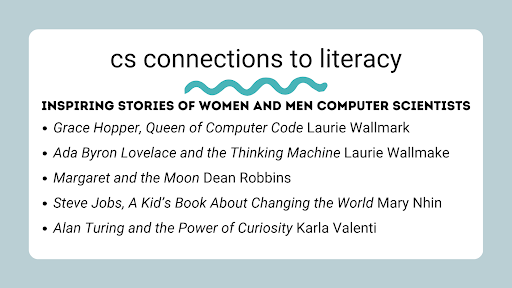Computer Science Education Week in December is an effort to inspire students to take an interest in computer science. This blog is a recap of all Keep Indiana Learning offered during the week. Don’t worry if you missed it! It’s never too late to expose students to new opportunities!
Computer Science week is in December to honor Grace Hopper, a legendary computer scientist, during her birthday week. Grace invented the first compiler, a device that translated written instructions into code which was then read by a computer. She truly was a pioneer in programming and computer science.
During this week, students may be exposed to activities and events that will capture their interest. Even if a computer science course is offered all year long, taking the time to recognize Computer Science Education Week allows students to see the importance of what they are learning and how it fits into the bigger picture of computer science. Even just by dedicating one hour during this week (or any week!), educators can inspire students. Since 2009, the “Hour of Code” has become a global initiative, and has reached tens of millions of students in over 180 countries. To learn more about Hour of Code, visit https://code.org/learn.
Image created by Jo Cox
“Throughout the computer science curriculum, students should be exposed to many different resources to have the richness of a variety of experiences.”
Throughout the computer science curriculum, students should be exposed to many different resources to have the richness of a variety of experiences. Not all computer science activities are online activities, especially for younger students. Some activities are “unplugged,” and involve hands-on manipulatives or pencil and paper. Unplugged activities are useful when demonstrating abstract concepts to students.
Just as in other areas of the curriculum, there are many literacy connections about computer science and computer scientists. Reading within the computer science classroom and about the concepts is one way to strengthen understanding.

Literacy isn’t the only curricular connection to computer science. STEAM lends itself to curricular connections with computer science as well. Pixel Art activities can be used with students of all ages, and the difficulty level can be adjusted to meet student abilities. Turtle Line Art is another project that incorporates art with computer science. Incorporating art and computer sciences provides another opportunity for students to learn computer science skills. It also reinforces problem solving and critical thinking which is at the core of what we want all students to learn.
“A main component of computer science class is learning how to problem solve and use critical thinking skills, with or without a device.”
All students will not have careers or go on to further studies in computer science. Why is it important for all students to be exposed to this area of the curriculum? Computer Science is much more than knowing how to use a computer. A main component of computer science class is learning how to problem solve and use critical thinking skills, with or without a device. The activities that students encounter within computer science class, such as coding or programming robots, allow students to practice solving problems. They will begin by identifying the challenge, then attempting to solve the problem by using what they have learned to create strategies and solutions. Solving the problems and puzzles allow students to feel success as the curriculum is scaffolded to more complex concepts and understandings. The underlying need to be able to persevere through difficult challenges remains the same, no matter the age of the student. The ability to problem solve and think critically will help students regardless of their future classes and choice of careers.
As technology advances, the lessons provided to students change as well. Indiana University Jacobs Educators developed lessons on the topic of Artificial Intelligence. These lessons have been created as hyperdocs and pathways for students to complete. Topics such as Artificial Intelligence are current events and would spark student interest.
Resources Provided by Laura Christie
The lessons in computer science classes are constantly evolving. As educators, we are lucky to have so many resources available to us. Technology is advancing so quickly we would never be able to keep up. It’s important to use the available resources so our students have the opportunities to learn to be critical thinkers and problem solvers. It is exciting to think about what technology our students will be using in the future.

